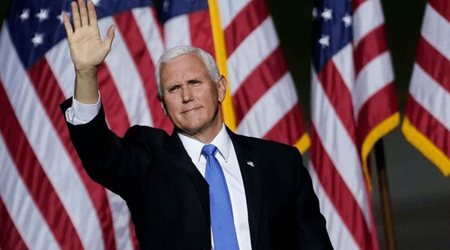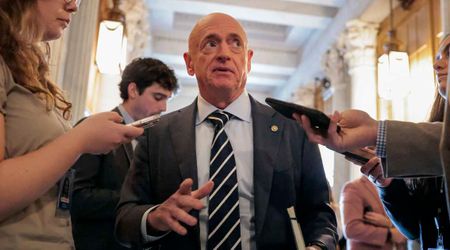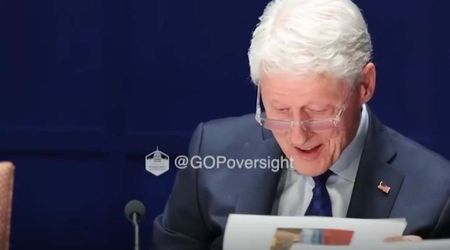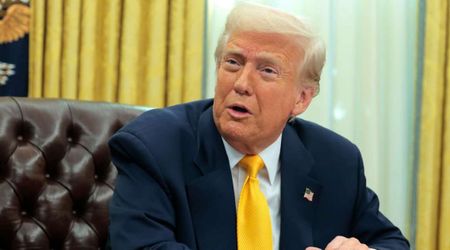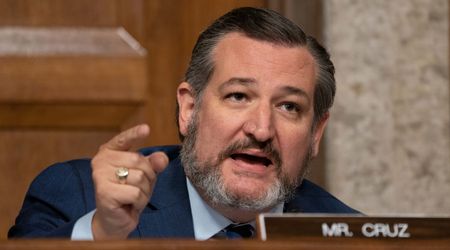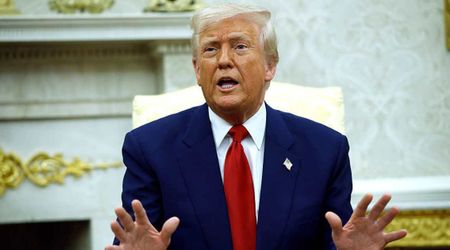Trump sparks controversy by suggesting Harris' nomination 'unconstitutional', stokes fears of poll chaos

PALM BEACH, FLORIDA: Former president Donald Trump is raising alarms among critics with his recent assertions that Vice President Kamala Harris's Democratic presidential nomination is unconstitutional.
These claims, reminiscent of his rhetoric leading up to the 2020 election, have led some to warn that Trump might be preparing to challenge the results of the upcoming election, much like he did four years ago.
Trump has repeatedly suggested that Harris replacing President Joe Biden as the Democratic nominee is a sinister move, equating it to a "coup" and questioning its constitutionality. He has particularly focused on the fact that Harris was not a top contender during the Democratic primary process, which he believes undermines the legitimacy of her candidacy.
Claims of a 'Coup'
Donald Trump has not shied away from inflammatory language when discussing Kamala Harris's nomination. He has described the process as a "coup," alleging that Joe Biden was forced out of the race to pave the way for Harris. In his view, the decision to make Harris the Democratic nominee, despite her poor performance in the primary, is inherently unconstitutional.
In his usual style, Trump took to Truth Social, his social media platform, to voice his outrage. He wrote that Biden's presidency was "Unconstitutionally STOLEN from him" and argued that Harris's nomination without primary success was a violation of the democratic process.
"From a constitutional standpoint, from any standpoint you look at, they took the presidency away," Trump said at a recent press conference.
“The fact that you can get no votes, lose in the primary system – in other words, you had 14 or 15 people, she was the first one out – and then you can then be picked to run for president. It seems to me actually unconstitutional. Perhaps it’s not,” Trump said.
Trump's rhetoric has sparked concern among both Democrats and some Republicans who fear that he is setting the stage to contest the election results if Kamala Harris wins. John Bolton, Trump's former national security adviser, brought up this concern during a CNN interview.
"We know one thing for sure. Trump never loses. And so if he's not the winner of 2024 as in 2020, it must be because he was treated unfairly, yet again," Bolton said.
“This is why people need to start thinking more now about how to deny Trump the ability the day after the election, if he loses, to try and throw the process into chaos again,” Bolton added.
David Axelrod, a former senior adviser to former president Barack Obama, echoed this sentiment, suggesting that Trump is "laying the predicate to reject the results of an election he now fears he may lose." This view is shared by many who recall Trump's refusal to accept the results of the 2020 election, which culminated in the January 6 Capitol riots.
Legal and constitutional concerns
Donald Trump's claims have also sparked discussions about the legal and constitutional implications of Kamala Harris's nomination. Some Republicans initially suggested that replacing Joe Biden on the ballot could face legal challenges. However, legal experts have largely dismissed these concerns, arguing that any such efforts would likely fail in court.
Sonia Gipson Rankin, a professor of law at the University of New Mexico, noted that Trump's argument hinges on the idea that voters are being deprived of their say because Biden, who was initially chosen in the primary, will not be on the ballot.
However, she pointed out that Democratic delegates never formally backed Biden as the party's nominee in a roll call vote, meaning his name was never officially on any ballots.
“Another issue will be who has standing to sue, and the RNC or former President Trump will have to decide if they want to pour resources toward this issue during this condensed campaign timeframe,” Rankin said. “Federal courts have particularly strict requirements for standing, while state courts have their own rules, which often ensure that major party nominees automatically appear on the ballot.”
Historical parallels
Donald Trump's current rhetoric is drawing parallels to his actions following the 2020 election. In that election, Trump spent months sowing doubt about the reliability of mail-in and absentee ballots. After the election, he claimed that the results were fraudulent or rigged, pursuing numerous legal challenges, all of which were rejected for lack of evidence.
According to The Hill, the campaign of disinformation eventually led to the January 6, 2021, attack on the Capitol, an event for which Trump has been criminally charged.
As the 2024 election approaches, Trump has stated that he will accept the results if he believes the election is "honest." However, given his history, many are skeptical of this claim. "Of course, there will be a peaceful transfer, and there was last time," Trump said recently. "And there'll be a peaceful transfer. I just hope we are going to have honest elections."
TRUMP: "Of course there will be a peaceful transfer, and there was last time, and there will be a peaceful transfer. I just hope we're gonna have honest elections. That's all." pic.twitter.com/Re2EXmLQ1v
— Townhall.com (@townhallcom) August 8, 2024
In response to Trump's latest claims, President Biden expressed doubts about the possibility of a peaceful transfer of power if Trump loses the 2024 election. In an interview with 'CBS Sunday Morning'.
Biden stated, "If Trump wins, no, I'm not confident at all. I mean if Trump loses I’m not confident at all." He later corrected himself, clarifying his concern about a peaceful transfer if Trump were to lose. "He means what he says," Biden added. "We don't take him seriously. He means it."


